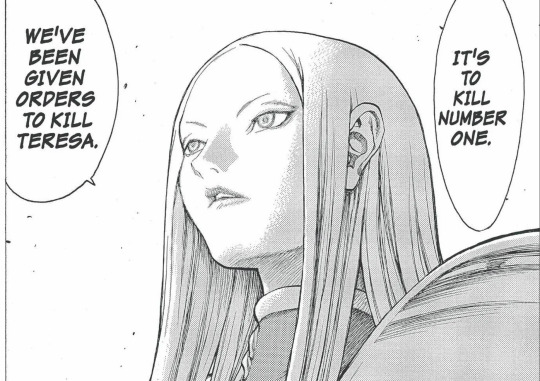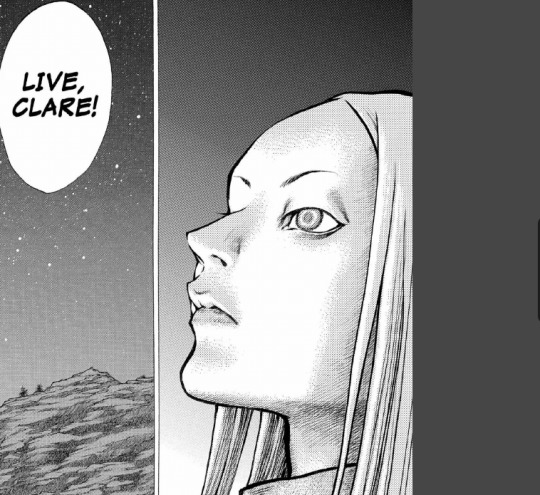#you can really tell Norihiro Yagi loved drawing her
Text


I thought there was a parallel between Teresa's era Irene and Clare's era Irene in her appearances but those panels are only slightly similar; so here, have these two vaguely linked images
#you can really tell Norihiro Yagi loved drawing her#so many panels of Irene feature her from different angles and mostly of her face#when you would see her fully it's in so much detail#and he really has a particular face shape for her that looks so round and youthful form the front yet angular and sharp from other angles#and as a person with a similar face shape I love that so much#Claymore#Irene Quicksword#Ilena Quicksword
27 notes
·
View notes
Text
Ten Books to Know Me
Rules: 10 books for people to get to know you better, or that you just really like.
Thanks to @phantomato for tagging me!
Little Women by Louisa May Alcott
This one is a childhood favorite. As a child, I identified the most with Amy March’s desire to live a leisurely life filled with art and material comforts. I ended up more like the intellectual and rebellious Jo (for a while) but could never commit to real rebellion or serious commitment to a career in the humanities, because it doesn’t pay well in this day and age. I decided I’d rather dabble in intellectual and artistic pursuits from a place of material comfort, much like Amy March after her Grand Tour of Europe.
Emma by Jane Austen
I read this in middle school and found Emma extremely entertaining. This is a comfort read for me.
Claymore (manga) by Norihiro Yagi
I love art style of this comic, the way the artist draws bodies, the lesbian undertones, and the incredibly charismatic characters.
Northern Lights by Philip Pullman (first book of the His Dark Materials trilogy)
At the heart of the novel is a critique of organized religion and dogma as controlling and oppressive forces suppressing knowledge and free will. This book gave me a language, as a high schooler, to understand my own aversion the way institutions like school and religion police and shame teenage girls as we come into knowledge of ourselves as sexual beings. It reframes the loss of innocence as an empowering experience, as being handed the keys to one’s own house.
Other Selves: Philosophers on Friendship (anthology) edited by Michael Pakaluk
An anthology of writings by philosophers throughout the ages on the topic of friendship. Montagne’s essay On Friendship is my favorite. I did quite a bit of (obsessive) research on the topic over the course of my undergrad studies and wrote my undergrad dissertation on depictions of romantic friendship in contemporary German literature.
Sommerhaus, Spaeter (Summerhouse, Later) by Judith Hermann
An anthology of wistful short stories based on the author’s experience in the milieu of young artists and intelligentsia living untethered, aimless lives, drifting through tentative friendships and romantic connections in and out of Berlin in the two decades after the fall of the Berlin Wall. I found it very relatable to my own experience of Berlin in the early 2010s. I was the same age as the protagonists of those stories, new in the city, half-heartedly pursuing a career in academia, wandering in and out of friend groups and various “scenes”, living with a sense of being constantly in flux.
Poems (an anthology) by Bai Juyi
9th century (Late Tang Dynasty) Chinese poet. I like his use of simple vernacular language, his storytelling, his ability to romanticize mundane details, his aesthetic descriptions of food, the seasons, and leisurely activities, his endearing and idiosyncratic love poems to various friends and lovers.
Imagined Communities by Benedict Anderson
A work of political theory exploring the concept of nationalism and the historical and cultural factors that contribute to the emergence of national identities. This book had a profound impact on my worldview.
The Satanic Verses by Salman Rushdie
A magical realist novel in which reality is literally shaped by competing narratives, leading to struggles between rival storytellers to tell the most compelling story so that their version of reality becomes “real”. This idea has influenced the way I approach writing fan fiction as telling a story to bring my interpretation of “canon” into reality (and sometimes launching a little rebellion against the Word-of-God in the process). On a related note: I wrote a master’s thesis about the depiction of imagined communities in this novel and other contemporary British and German fiction. What can I say? I tend to write long papers analyzing my favorite books, as those of you who follow me because of The Charioteer would know 😅
The Charioteer by Mary Renault
Currently obsessed with it. Takes place in Britain during World War Two. The two protagonists are complex and fascinating. I find their love story deeply romantic and moving. The depiction of the small queer community is quite entertaining and endearing. The novels explores a lot of the philosophical questions that I’d obsessed over in uni so I had lots of fun revisiting those topics and reflecting on how my interpretations and views have and haven’t changed.
10 notes
·
View notes